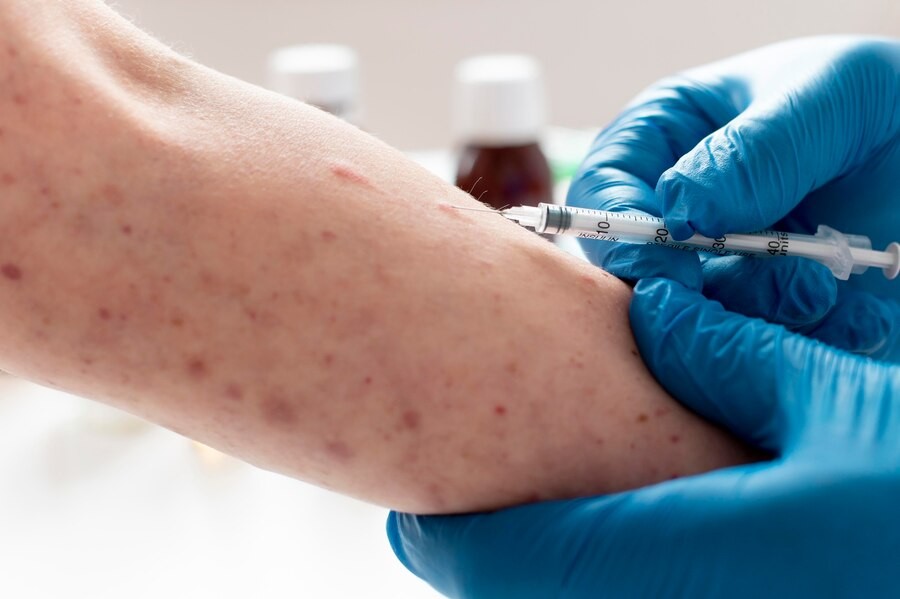Cacar monyet atau yang kini lebih sering disebut Mpox pada awalnya ditularkan dari hewan ke manusia. Penyakit yang termasuk dalam keluarga virus penyebab cacar (smallpox) ini juga bisa menular antar manusia.
Penularan antar manusia terutama melalui kontak langsung dengan luka lepuhan di kulit, cairan tubuh, atau benda-benda yang terkontaminasi. Penularan juga bisa terjadi melalui droplets saat melakukan kontak dengan orang yang terinfeksi.
Apakah Mpox Bisa Diobati?
Tidak ada obat khusus yang dapat mengobati penyakit cacar monyet (Mpox). Pengobatan biasanya difokuskan untuk meredakan gejala dan mencegah komplikasi.
Baca Juga: Cara Mencegah Infeksi Cacar Monyet (Mpox)
Pengobatan untuk Mengatasi Mpox
Pengobatan Mpox biasanya dimulai dengan mencegah penularan virus. Ini berarti pasien yang positif terinfeksi Mpox perlu menjalani isolasi untuk mencegah penularan ke anggota keluarga, orang lain, atau petugas kesehatan.
Selanjutnya, berikut adalah beberapa pengobatan yang bisa diberikan:
Pengobatan simptomatik
Karena tidak ada obat khusus yang secara langsung membunuh virus monkeypox, maka pengobatan yang diberikan hanya fokus untuk meredakan gejala yang muncul, di antaranya:
- Mengelola demam dan nyeri dengan obat seperti parasetamol atau ibuprofen agar dapat menurunkan demam dan meredakan rasa sakit akibat ruam atau pembengkakan.
- Memastikan cukupnya asupan cairan, baik melalui air minum maupun cairan infus
- Memberikan antihistamin atau salep yang dapat menenangkan dan mengurangi gatal akibat ruam
Pengobatan antivirus
Dalam beberapa kasus, obat antivirus juga diberikan untuk membantu melawan infeksi Mpox, terutama pada orang dengan kondisi imunokompromais (memiliki kekebalan tubuh yang lemah).
Obat antivirus bekerja dengan menghambat replikasi virus sehingga dapat memperlambat penyebaran infeksi di dalam tubuh. Obat antivirus biasanya hanya disarankan untuk kasus-kasus yang parah.
Perawatan ruam dan lesi
Ruam dan lesi menjadi salah satu gejala utama Mpox yang mungkin berkembang menjadi infeksi sekunder bila tidak dirawat dengan baik. Untuk itu, lesi tidak boleh digaruk, area ruam harus tetap bersih dan kering, yang artinya Anda tetap harus mandi dan menggunakan salep antibiotik topikal jika terjadi infeksi kulit pada ruam.
Baca Juga: Mengenal MVA-BN, Vaksin Mpox yang Digunakan di Indonesia
Vaksinasi sebagai pencegahan
Meskipun tidak secara langsung mengobati orang yang sudah terinfeksi, vaksin dapat memberikan perlindungan terhadap Mpox. Vaksin yang diberikan saat ini adalah vaksin cacar yang telah disetujui sebagai pencegahan Mpox.
Orang yang telah terpapar virus Mpox akan diberikan vaksin dalam waktu empat hari setelah terpapar. Ini dapat membantu mencegah perkembangan gejala dan memperingan keparahan penyakit.
Perawatan lanjutan
Setelah gejala akut mereda, Anda perlu mendapatkan perawatan lanjutan dan pemulihan. Perawatan ini berupa pemantauan selama beberapa minggu untuk memastikan tidak ada komplikasi yang mungkin terjadi, seperti pneumonia, atau infeksi di otak dan mata yang dapat membahayakan jiwa.
Apabila Anda mengalami gejala mirip flu, munculnya ruam kulit yang berkembang menjadi lesi berisi cairan, segera periksakan diri ke dokter atau berkonsultasi dengan dokter kami melalui aplikasi Ai Care yang dapat diunduh di App Store atau Play Store.
Mau tahu informasi seputar penyakit lainya? Cek di sini, yah!
- dr Nadia Opmalina
Cleveland Clinic (2023). Mpox. Available from: https://my.clevelandclinic.org/health/diseases/22371-monkeypox
CDC (2024). Clinical Treatment of Mpox. Available from: https://www.cdc.gov/mpox/hcp/clinical-care/?CDC_AAref_Val=https://www.cdc.gov/poxvirus/mpox/clinicians/treatment.html
Health Direct (2024). Mpox (Monkeypox). Available from: https://www.healthdirect.gov.au/monkeypox
Pritish K. Tosh, MD (2024). What is mpox, previously called monkeypox?. Available from: https://www.mayoclinic.org/diseases-conditions/infectious-diseases/expert-answers/monkeypox-faq/faq-20533608
National Institute of Allergy and Infectious Diseases (2024). Mpox Treatment. Available from: https://www.niaid.nih.gov/diseases-conditions/mpox-treatment
WebMD (2023). What Does Immunocompromised Mean?. Available from: https://www.webmd.com/a-to-z-guides/what-does-immunocompromised-mean












